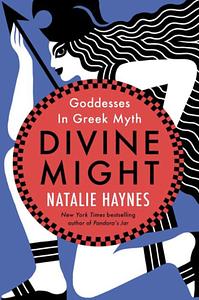Take a photo of a barcode or cover
adventurous
informative
inspiring
medium-paced
adventurous
informative
lighthearted
fast-paced
informative
medium-paced
Moderate: Animal cruelty, Animal death, Child abuse, Child death, Death, Emotional abuse, Incest, Infidelity, Misogyny, Rape, Sexism, Sexual assault, Sexual violence, Slavery, Suicide, Torture, Toxic relationship, Violence, Grief, Cannibalism, Death of parent, Murder, Pregnancy, Sexual harassment, War
Minor: Adult/minor relationship, Blood
funny
informative
medium-paced
I really enjoyed this, Haynes has been really conscientious in fleshing out all these different women from Greek myth, and I appreciated the breadth of work in which she referenced to support this sort of throughline effect in how we so often view women in media. This is evidently thoroughly well researched and Haynes is, naturally, an expert in this space.
The chapter on Hestia was my favourite, and I think is where Natalie Haynes thesis - wherein the women in Greek myth can equally hold their own against the men shines brightest. Hestia, by Haynes own account, is difficult to explore (and write 10,000 words on), simply because there isn’t a lot on her. Haynes research here, her reflections, and the way she weaves Hestia’s influence into the modern day is therefore excellently done, and I really appreciated it.
I think too, when Haynes explores Greek figures with a maligned reputation (Hera, specifically, comes to mind here) is where this book is at its strongest. Particularly as these chapters gave way to some thoroughly interesting and engaging working the etymological background on the way Greek words behaved and looked on a page, and how this would really emphasise how these women were constructed and perceived.
I think where this fell short were there were some Very Specific cultural references that already felt outdated when reading. In a book so deliberately filled with modern cultural examples, it is of course difficult to effectively allow them to resonate in the long term. I felt like here, there were just a couple instances where I had to raise my eyebrow, (was Hawkeye really the cultural juggernaut Haynes suggests? When comparing to the rest of the Marvel’s properties, it doesn’t feel like it. Especially when other arrow-wielding women like Merida in Brave or Susan Pevensie exist to complement Katniss Everdeen - a delightful addition to be said). I do though, appreciate the intention behind why she made the choices she did, and very much enjoyed Haynes sparkling wit as she interposed her own thoughts on cultural items and the Greek women themselves.
I haven’t read any of her fiction yet, but knowing her analysis on these women here has really encouraged me. She has a very empathetic, nuanced, well-rounded approach that I really respect, and explains a lot to me why her fiction is so popular.
The chapter on Hestia was my favourite, and I think is where Natalie Haynes thesis - wherein the women in Greek myth can equally hold their own against the men shines brightest. Hestia, by Haynes own account, is difficult to explore (and write 10,000 words on), simply because there isn’t a lot on her. Haynes research here, her reflections, and the way she weaves Hestia’s influence into the modern day is therefore excellently done, and I really appreciated it.
I think too, when Haynes explores Greek figures with a maligned reputation (Hera, specifically, comes to mind here) is where this book is at its strongest. Particularly as these chapters gave way to some thoroughly interesting and engaging working the etymological background on the way Greek words behaved and looked on a page, and how this would really emphasise how these women were constructed and perceived.
I think where this fell short were there were some Very Specific cultural references that already felt outdated when reading. In a book so deliberately filled with modern cultural examples, it is of course difficult to effectively allow them to resonate in the long term. I felt like here, there were just a couple instances where I had to raise my eyebrow, (was Hawkeye really the cultural juggernaut Haynes suggests? When comparing to the rest of the Marvel’s properties, it doesn’t feel like it. Especially when other arrow-wielding women like Merida in Brave or Susan Pevensie exist to complement Katniss Everdeen - a delightful addition to be said). I do though, appreciate the intention behind why she made the choices she did, and very much enjoyed Haynes sparkling wit as she interposed her own thoughts on cultural items and the Greek women themselves.
I haven’t read any of her fiction yet, but knowing her analysis on these women here has really encouraged me. She has a very empathetic, nuanced, well-rounded approach that I really respect, and explains a lot to me why her fiction is so popular.
funny
reflective
fast-paced
informative
reflective
medium-paced
funny
informative
lighthearted
medium-paced
adventurous
funny
informative
reflective
medium-paced
funny
informative
medium-paced


